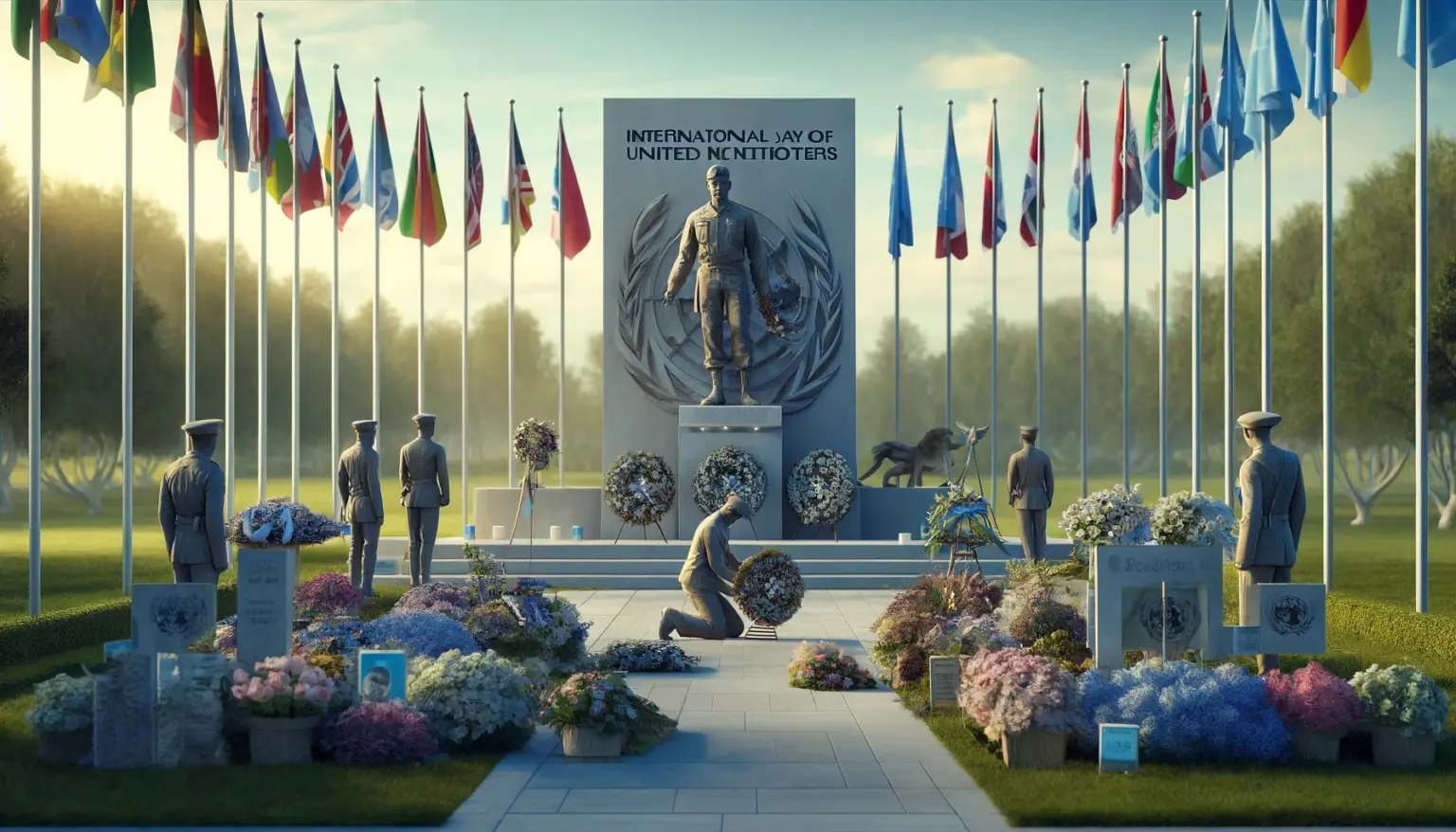The International Day of United Nations Peacekeepers, observed annually on May 29, is a day to honor the brave men and women who serve in UN peacekeeping missions around the world. This day is dedicated to recognizing their invaluable contributions to maintaining international peace and security. It also serves as a solemn reminder of the sacrifices made by peacekeepers who have lost their lives in the line of duty.
The significance of this day extends beyond mere commemoration; it is an opportunity to raise awareness about the critical role of peacekeeping in conflict zones. It underscores the global commitment to peace and the collaborative efforts of nations to support stability in volatile regions.
History and Background: The Origins of International Peacekeeping Day
The International Day of United Nations Peacekeepers was established by the UN General Assembly in 2002. The date, May 29, marks the anniversary of the creation of the United Nations Truce Supervision Organization (UNTSO) in 1948, the first ever UN peacekeeping mission. This mission was deployed to monitor the ceasefire after the 1948 Arab-Israeli War.
Over the decades, UN peacekeeping missions have evolved significantly. From initial monitoring and observer roles, peacekeepers have taken on complex tasks including disarmament, election monitoring, and rebuilding infrastructure. The evolution of peacekeeping reflects the changing nature of conflicts and the need for adaptive, multi-dimensional approaches to peace and security.
Role and Importance: The Critical Functions of UN Peacekeepers
UN peacekeepers play a crucial role in maintaining international peace and security. Their primary functions include conflict prevention, peacebuilding, and post-conflict recovery. By deploying to volatile regions, peacekeepers help prevent the outbreak or escalation of conflicts, providing a stabilizing presence.
Peacekeeping missions involve diverse roles, with military personnel, police, and civilian staff working together. Military peacekeepers protect civilians and deter violence, police peacekeepers train local law enforcement, and civilian staff work on political and humanitarian efforts. Together, they create a comprehensive approach to fostering long-term peace and stability.
Challenges Faced: The Hardships of UN Peacekeeping
UN peacekeepers operate in some of the most dangerous and challenging environments in the world. They face significant risks, including physical harm from armed conflict, landmines, and terrorist attacks. Living conditions in conflict zones are often harsh, with limited access to basic necessities and medical care.
Logistical and operational challenges further complicate peacekeeping missions. Limited resources, complex political landscapes, and coordination with multiple stakeholders can hinder mission effectiveness. Additionally, peacekeepers often experience psychological and emotional stress due to prolonged exposure to conflict and the high demands of their roles.
Achievements and Success Stories: Celebrating Peacekeeping Triumphs
Despite the challenges, UN peacekeepers have achieved remarkable successes. For example, the UN mission in Liberia (UNMIL) played a crucial role in ending the civil war and supporting the country’s transition to peace and democracy. Similarly, the UN mission in Sierra Leone (UNAMSIL) helped disarm combatants and facilitate post-war recovery.
Individual peacekeepers also have inspiring stories of bravery and dedication. In 2019, the Captain Mbaye Diagne Medal for Exceptional Courage was awarded posthumously to Chancy Chitete, a Malawian peacekeeper who sacrificed his life to save a fellow soldier in the Democratic Republic of Congo. Such stories highlight the extraordinary commitment of peacekeepers to their mission.
Current Peacekeeping Missions: A Global Overview
As of today, there are several ongoing UN peacekeeping missions across the globe. These include missions in South Sudan, Mali, the Central African Republic, and Lebanon, among others. Each mission has specific objectives, such as protecting civilians, supporting the implementation of peace agreements, and assisting in political transitions.
For instance, the UN mission in South Sudan (UNMISS) focuses on protecting civilians and supporting the peace process in the world’s youngest nation. In Mali, the UN mission (MINUSMA) aims to stabilize the country amid ongoing conflicts and terrorist threats. These missions are vital in preventing further deterioration of conflicts and supporting recovery efforts.
Future of UN Peacekeeping: Adapting to New Challenges
The future of UN peacekeeping lies in adapting to modern conflicts and global challenges. Innovations in technology, enhanced training programs, and stronger collaboration with regional organizations are crucial for improving the effectiveness of peacekeeping operations. Embracing these changes will enable peacekeepers to better respond to complex and dynamic conflict environments.
International cooperation and support remain essential for sustaining peacekeeping efforts. By bolstering resources, sharing best practices, and fostering political will, the international community can enhance the capacity of peacekeeping missions to achieve lasting peace and security in conflict-affected regions.
Conclusion: Reinforcing the Importance of Peacekeeping
In conclusion, the International Day of United Nations Peacekeepers is a vital occasion to honor the courage and dedication of peacekeepers worldwide. Their efforts are indispensable in promoting peace and security in some of the most challenging environments. By recognizing their contributions and supporting their missions, we reaffirm our collective commitment to a more peaceful and secure world.
10 Interesting Facts About the International Day of United Nations Peacekeepers
- The International Day of United Nations Peacekeepers is observed on May 29 each year.
- The day marks the anniversary of the first UN peacekeeping mission, the United Nations Truce Supervision Organization (UNTSO), established in 1948.
- Over 1 million peacekeepers from over 120 countries have served in UN missions since 1948.
- The theme for the 2023 observance was “People Peace Progress: The Power of Partnerships.”
- The UN has 12 ongoing peacekeeping missions around the world, including in South Sudan, Mali, and the Central African Republic.
- More than 4,000 UN peacekeepers have lost their lives in the line of duty since 1948.
- Women currently make up about 6% of UN military personnel and 11% of police personnel in peacekeeping missions.
- The UN peacekeeping budget for 2021-2022 was approximately $6.38 billion, funded by contributions from member states.
- The UN Charter provides the legal foundation for peacekeeping missions, emphasizing the role of international cooperation in maintaining peace and security.
- The Dag Hammarskjöld Medal is awarded posthumously to UN peacekeepers who have died in service, named after the former UN Secretary-General.












Honoring the guardians of peace on International Day of United Nations Peacekeepers. Truly inspiring!
Peacekeepers day tribute
Nice tribute!
The tribute to UN Peacekeepers is very touching. It’s important to recognize their efforts in maintaining peace.
International Day of United Nations Peacekeepers is a significant tribute. This article captures the importance of honoring those who serve for peace. Well done!
The page about the International Day of United Nations Peacekeepers is very informative and engaging. It offers a detailed look at the history and significance of the day, along with some interesting facts and tributes to peacekeepers. The information is well-organized and easy to read, making it a pleasure to navigate. This site is a fantastic resource for anyone wanting to learn more about the International Day of United Nations Peacekeepers.
The page on International Day of United Nations Peacekeepers is respectful and thorough. It provides a detailed history and significance of the day, with heartfelt tributes. The information is well-presented, making it a meaningful read. Ideal for those interested in global peace efforts.